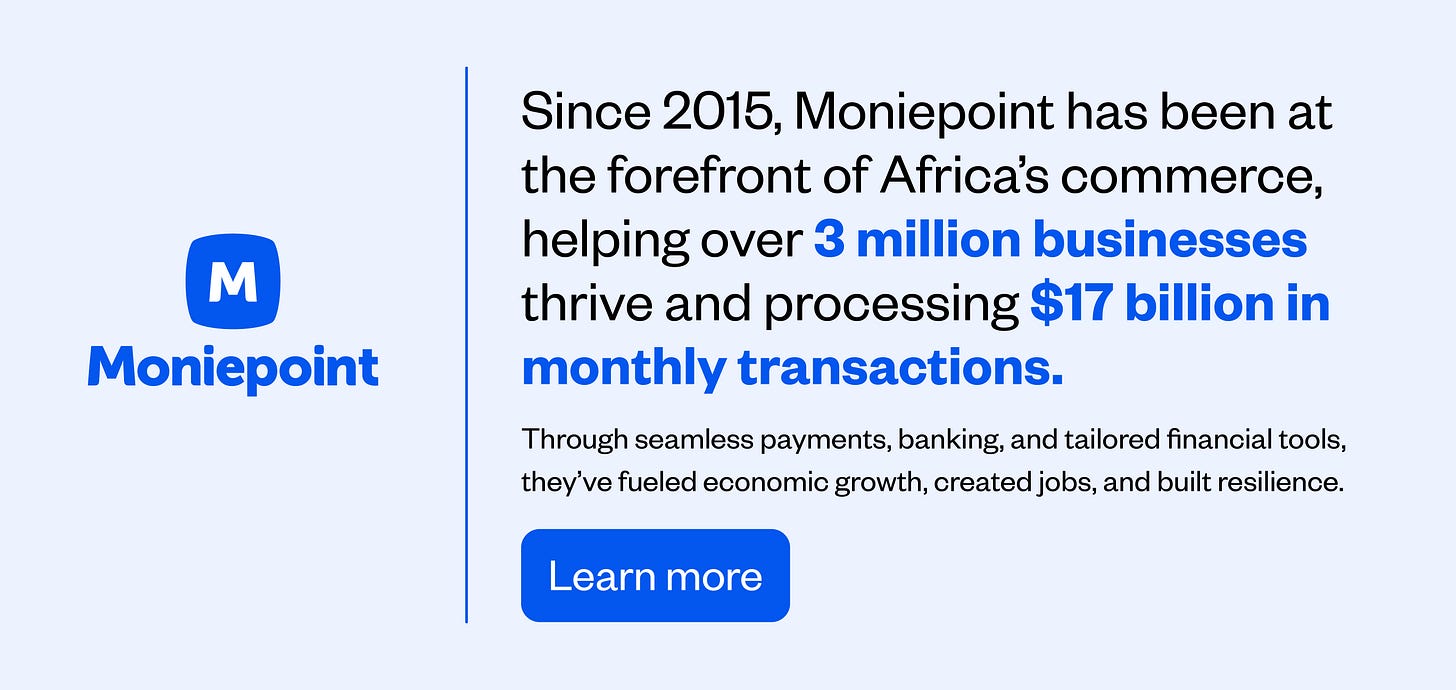Communiqué 82: Filmhouse takes a third stab at streaming
With major streamers exiting the market, Filmhouse wants to fill the gap as a global niche platform for Nollywood.
Presented by Moniepoint
Key Points
Own a niche: Trying to appeal to everyone is expensive and unsustainable. Kava is betting on Nollywood because it’s a clear niche with a growing global fanbase. Creative entrepreneurs and investors should focus on one specific audience and serve them deeply. That focus builds loyalty and long-term value.
Plan for the entire lifecycle of a film: With the rise of niche streaming platforms. There’s an added layer in the distribution cycle for films. Creative investors should look for opportunities to license or monetise work after its peak attention phase.
Invest in community: Beyond streaming, Kava’s success may depend on its ability to create a community for Nollywood lovers. Likewise, creative investors and entrepreneurs launching new products should prioritise community to turn users into advocates.
1. Kava and chill?
Last month, at a star-studded event in Lagos, Filmhouse Group unveiled its latest venture: Kava, a new streaming platform for Nollywood, launched in partnership with production powerhouse Inkblot Films.
When Kava goes live in late August, it will debut with over 30 premium Nollywood titles, including exclusive post-theatrical releases like the comedy-drama Alakada: Bad and Boujee, Owambe Thieves, and What About Us, the debut film from rising studio Narrative Entertainment. New titles will be added weekly, and original programming is already being developed.
Kava joins a growing wave of producer-led streaming platforms emerging in the wake of prominent global streamers pulling back from the African market. But what exactly is the play here?
Why are these new streamers betting on a model where even Netflix has struggled to survive? And perhaps most importantly: what is Filmhouse doing differently this time, after two earlier attempts at building a Nollywood-focused streaming service?
2. Third time’s the charm?
Filmhouse Group’s streaming ambitions are not new. The company’s first foray into digital distribution came in 2018 with MyFilmhouse.ng, a platform that promised to bring Hollywood and Nollywood films directly to Nigerian consumers. But at the time, Nigeria’s market was still largely dependent on physical DVDs, pirated content, and traditional TV. MyFilmhouse struggled to gain traction and quietly faded out.
In 2021, Filmhouse tried again with Filmhouse Plus. Billed as both a streaming platform and a digital community for film lovers, Filmhouse Plus launched with curated content, behind-the-scenes footage, filmmaker interviews, and integrated digital ticketing for cinema releases. It was an ambitious attempt at creating a home for Nollywood’s emerging digital audience. But the platform soon ran into some challenges.
The company had expended a lot of resources in building and maintaining the tech stack for streaming, but even then, the app was still riddled with bugs. A previous Communiqué essay detailed persistent UX issues that plagued the platform. And even if its tech problems had been resolved, a bigger challenge loomed: Netflix and Amazon Prime Video had entered the Nigerian market, sparking a bidding war for premium Nollywood content. Filmhouse couldn’t compete for content at that level, so its streaming dreams fizzled out once again.
Now, the stars seem to have aligned to favour Filmhouse. Amazon Prime Video has fully exited the Nigerian market, and Netflix has scaled back significantly, slowing down its local productions and narrowing its slate. For the first time in years, the race to own Nollywood’s digital future is wide open, and with Kava, Filmhouse may be the most prepared to seize the moment. But this time, with a different strategy.
There are two ways to build a global streaming business. The first—the wide way—is to offer a massive content library that caters to a wide range of audiences with varying tastes. Platforms like Netflix, Amazon Prime, and Hulu have entered this way.
Then there’s the narrow way: building a platform that serves a particular audience, with deep, tailored content that speaks directly to them. Platforms like Shudder (horror), Crunchyroll (anime), and Revry (LGBTQ+ content) have proven this model works. Kava seems to have found the narrow way.
Filmhouse is positioning Kava as a niche global home for Nollywood and African content. This platform seeks to serve the growing demand for Nollywood content worldwide.
“When we’re able to deliver content at scale to audiences that are not just us, they will understand and fall in love with the stories that we have. They just don’t know it yet, but they will fall in love with us,” Kava co-CEO Chinaza Onuzo said to TechCabal.
3. A crunchy success story
To understand niche streaming, it helps to understand its most successful example: Crunchyroll.
Crunchyroll was founded in 2006 as a scrappy startup built by a group of UC Berkeley graduates who began by uploading pirated anime content for fans worldwide. But by 2009, the platform had gone legit, licensing content directly from Japanese studios and building a paid subscription model for anime lovers outside Asia. Over time, Crunchyroll cultivated a hyper-loyal audience by focusing only on anime. It invested in community-building features like fan forums, simulcasts that released new episodes the same day as Japan, and even a merchandising arm. In 2017, it hit 1 million paying subscribers, and three years later, Sony acquired it for $1.2 billion.
Other platforms have followed similar paths: Shudder has become the go-to platform for horror enthusiasts; CuriosityStream offers a buffet of science and documentary programming; and BroadwayHD caters to theatre fans by streaming live-recorded Broadway and West End productions.
4. How will a niche Nollywood streaming platform succeed?
To build a successful niche streaming platform, there must first be global cultural demand for the niche content. Crunchyroll’s rise coincided with the growing global appetite for anime. The same principle must apply to Nollywood: if global demand for Nigerian and African storytelling continues to rise, then a dedicated platform like Kava has a strong chance of scaling internationally.
We can measure that demand by examining how Nollywood content performs on global streaming platforms today. Black Book, arguably the most successful Nollywood film on Netflix, hit the number one spot in 12 countries and made the Top 10 in over 60. That’s no small feat, but compare that to anime’s current global pull: K-Pop: Demon Hunters, the most-watched anime on Netflix, hit #1 in 33 countries and made the Top 10 in 93. Anime is ahead in global reach, but Nollywood is clearly gaining ground. There’s already enough momentum for a platform like Kava to build a strong foundation around.
But even with cultural demand, success won’t be immediate. Crunchyroll didn’t explode overnight. It took 11 years to hit 1 million paying subscribers, 14 years to reach 5 million, and only in the last few years, fueled by anime’s international boom, did it accelerate to 15 million subscribers. Niche platforms grow slowly, but they can scale with consistency and a loyal base.
The second pillar of success for a niche streamer is aggregation: owning the widest, deepest, and most valuable library in the niche. Offering only new films is not enough; Kava and other niche streamers must become the home of Nollywood, from the latest hits to cult classics.
For Kava, this is where its partnership with Inkblot matters. As one of Nigeria’s most commercially successful production houses, Inkblot brings an immediate boost in content quality and volume. Its catalogue, which includes titles like The Set Up, The Wedding Party 2, and Up North, gives Kava a strong opening hand. But one studio isn’t enough.
Kava must strike licensing deals with other major production houses and independent filmmakers to truly dominate, securing streaming rights across the industry. For many of these producers, Kava will need to insert itself at the end of the content lifecycle: after the cinema run and global licensing windows with Netflix or Prime expire. That new pipeline might look like this:
Cinema release → Global streamer → Niche home on Kava.
This is already happening. Several Nollywood films streaming on Netflix are set to leave the platform this month as their licenses expire. Many are expected to find new homes on niche platforms like Kava.
But beyond the content, a key ingredient for the success of a niche Nollywood streaming platform is community. It’s not enough to stream great content. For Kava or any Nollywood-focused platform to truly thrive, it must become the digital town square for Nollywood fans worldwide. That means embedding community tools that allow viewers to connect, debate, review, recommend, and engage with the content and each other.
This strategy has worked well for other niche platforms. Crunchyroll grew because it became the hub of anime fandom. It built forums, hosted conventions, supported fan art, and enabled early access to merchandise. Shudder, the horror streaming platform, has cultivated a dedicated user base through curated collections, live-streamed watch parties, and strong editorial content.
For a Nollywood streamer like Kava, this could mean building spaces for fans to discuss films, follow favourite directors, participate in virtual premieres or Q&As, write reviews, and even co-watch titles with friends. The more fans feel connected to each other and to the creators, the more likely they are to stick around, advocate for the platform, and invest emotionally in its success.
Nollywood already has a vibrant, vocal fanbase. The next step is to give them a home. If Kava gets the tech, the content, and the experience right, it could become Nollywood’s global home.




